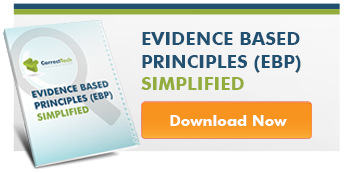Adapting CBT for Justice-Involved Clients - Check out the Blog Series!
Posted by Raymond Chip Tafrate, PhD, Damon Mitchell, PhD, & David J. Simourd, PhD on 3/13/20 6:00 AM
Topics: Assessment, Community Corrections Professional, Addiction, Relapse Prevention, client development, Developing a practice model, coaching community corrections clients, reentry, client needs and values, risk, EBP, Justice-Involved Clients, jic
What’s Behind the Box?
Posted by Raymond Chip Tafrate, PhD, Damon Mitchell, PhD, & David J. Simourd, PhD on 10/17/19 10:13 PM
Risk Assessment is Not the Same as Case Formulation
We would like to start with a story. Picture a courthouse in a struggling industrial town in Connecticut. The adult probation department is situated in the basement of this courthouse. We are beginning training with a new cohort of probation officers, teaching them how to incorporate forensic CBT techniques into their work. To start, one of the officers describes a current case and reviews the available assessment information. A quick review of the risk assessment reveals this is a high-risk case; a major area of concern is antisocial companions. We ask the officer to explain how friends and companions specifically influence criminal behavior for this justice-involved client (JIC). We get crickets! We ask, what role did friends play in the most recent offense? Again, an awkward silence permeates the room. While the officer certainly knows that antisocial companions is a risk factor for reoffending, she has not explored the nature of the JIC’s relationships and discussed with the JIC the specific role of companions in his offense history and daily routines. Unfortunately, this is a common training scenario when we begin.
Read MoreTopics: Assessment, Developing a practice model, coaching community corrections clients, client needs and values, risk, Justice-Involved Clients, jic
Subscribe To Our Blog
Recent Posts
Posts by Topic
- Community Corrections (63)
- Evidence Based Practices (44)
- Community Corrections Professional (23)
- Software (15)
- Practices (12)
- Change (11)
- Technology (10)
- Risk Principle (8)
- reentry (8)
- probation staff (7)
- EBP (6)
- Outcomes (6)
- client development (6)
- client needs and values (6)
- coaching community corrections clients (6)
- Assessment (5)
- Community (5)
- Developing a practice model (5)
- Justice-Involved Clients (5)
- Remote work (5)
- The Coaching Habit (5)
- parole (5)
- risk (5)
- tele-supervision (5)
- tele-work (5)
- Community Engagement (4)
- Evan C. Crist (4)
- Community Corrections Client Services (3)
- Criminal Justice Reform (3)
- Implementation (3)
- Listening Skills (3)
- Motivational Interviewing (3)
- Policy (3)
- Positive Reinforcement (3)
- Practice Models (3)
- high risk client (3)
- reaching clients emotions (3)
- responsivity (3)
- Addiction (2)
- BOP (2)
- Conferences (2)
- ICCA (2)
- Management (2)
- Michael Bungay Stanier (2)
- Relapse Prevention (2)
- halfway house (2)
- jic (2)
- paperless office (2)
- principles (2)
- procedures (2)
- program results (2)
- APPA (1)
- Appreciative Thinking (1)
- Brian Lovins (1)
- COVID-10 (1)
- Community Connection (1)
- Coronavirus (1)
- Crisis (1)
- Customer Service (1)
- Data Management (1)
- Fidelity (1)
- ICCA Seattle (1)
- Juvenile Corrections (1)
- Leadership (1)
- Monitor History (1)
- Opioid Addiction (1)
- Opioid Crisis (1)
- Orange is the New Black (1)
- Program Data (1)
- Reforms (1)
- Relapse (1)
- Second Chances (1)
- Switch by the Heath Brothers (1)
- Treatment (1)
- drug testing (1)
- going paperless (1)
- govcio outlook (1)
- impact sessions (1)
- innovation (1)
- intrinsic motivation (1)
- justice reinvestment (1)
- marijuana testing (1)
- money savings (1)
- opiod testing (1)
- purpose (1)
- remote working (1)
- resources (1)
- sanction (1)
- staff productivity (1)
- technology solutions provider (1)
- the awe question (1)
- what works (1)
- what's on your heart (1)
- work from home (1)



